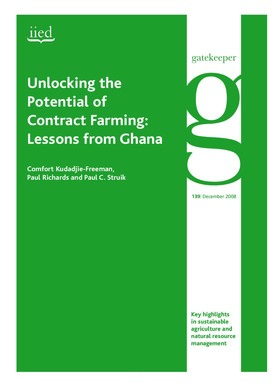Unlocking the Potential of Contract Farming: Lessons from Ghana

There have been many reviews and evaluations of contract farming and its usefulness for the small farmer in Africa. Some see contractual arrangements as disadvantageous to farmers, while others see them as beneficial. Despite these debates, contract farming is likely to continue as a means of keeping small farmers involved in markets. It is therefore important to learn from past experiences in order to improve the working of the system as a whole.
This paper analyses sorghum contract farming in north-east Ghana in order to explore ways of making such arrangements viable for small farmers. The analysis draws on the convergence of sciences approach, which sees both science and social relations interactions among the relevant stakeholders) as important for developing small farmer-relevant agricultural innovations (technology, procedures, new forms of organisation). The study reveals that the failure and problems encountered in this particular contracting scheme were both technical and institutional. The technical issues were a combination of pest problems, the environment and the sorghum variety chosen. The institutional issues involved the contractual arrangements and relations between the contracting parties. The authors argue that if contracts are to be fair, they must allow for compensation, contingencies and production risks. But scientific knowledge is required in order to adequately incorporate these elements.
Cite this publication
Available at https://www.iied.org/14575iied